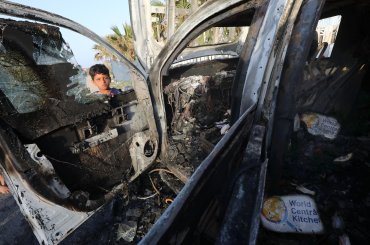Ramallah, Palestine
Two weeks ago, Roger Cohen entered my life and that of several Palestinians I introduced him to in the West Bank by having us believe that he sincerely wanted to hear our stories and know our reality. But The New York Times column that came out of it, “It’s Time for Mahmoud Abbas to Go,” intentionally ignores the big picture, the reality of Palestinian life, in his account of a West Bank visit from Ramallah to the city of Nablus.
The backstory to my contact with Cohen is that in early January an American university professor whom I trust and respect asked me to host and escort his New York Times friend visiting the West Bank on a drive from Ramallah to Nablus. I work at an NGO and always agree to meet anyone who is visiting from the States because I want to show the real face of Palestine, the face that many people in the United States don’t know. During my recent year spent studying in the US, I was always open to meeting people from different backgrounds. These were opportunities that allowed me to speak about my people’s struggle for justice and human rights.
Cohen said he was interested in seeing Israeli settlements along the way (recognized internationally as illegal), of walking around Balata, the West Bank’s largest refugee camp, and of touring the historic Old City of Nablus. Hence, I envisioned my time with Cohen as an opportunity for us to have someone from the Times hear our voices, know our stories, and write about the current situation in the West Bank, especially after Trump’s decision of recognizing Jerusalem as the capital of Israel.
However, the resulting article (published January 27) slanted the telling of what life is like for the Palestinians Cohen met. While he mentioned the “unrelenting settlement growth and use of military force” under Israeli occupation, Cohen did not fully disclose to readers the primacy of Israel’s agency in: Palestinian electricity coming and going, Palestinian lack of access to water, Palestinian hours-long journeys, Palestinians being “dragged from their homes,” and the endless Israeli permits that regulate all manner of Palestinian movement within and beyond the West Bank. Cohen dispenses of these realities of Palestinian life, saying, “Little humiliations multiply.”
No, the emphasis in the article was on the Palestinian Authority’s responsibility for these conditions. Cohen quotes me in the article:
“There’s a growing climate of fear,” said Darin Hussein, the country manager for a nongovernmental organization encouraging sports for Palestinian children. “You can be arrested for posting anything critical on social media.” In her mid-30s, she, too, has hit bottom. “Nothing is going to change,” she told me.
But he misrepresented my critique of why “there’s a growing climate of fear,” thus, presenting my quote in order to serve his own agenda. Cohen’s agenda was to say that Palestinians have “agency” in our own absence of freedom and thereby absolve Israel of being the primary source of Palestinian oppression; hence, he purposely couched all of our fears, criticisms, and expressions of hopelessness in what he, an ardent supporter (if also a critic) of the Israeli state, describes as the failures of the government of the Palestinian Authority. As if we can have freedom if we just get rid of the P.A. But surely a people living under a military occupation within the confines of an apartheid state do not live in an independent, free, and sovereign state. Surely an honest American journalist would make clear to his American audience the settler-colonial status of Palestine.
For instance, though Cohen accurately quotes Saed Abu Hijleh, a geography professor who was shot and imprisoned by Israel and whose mother was killed by Israeli soldiers, he immediately states that this view is the Palestinian narrative.
He [Abu-Hijleh] describes Israel as a “colonial apartheid state” built on the “perpetuation of violence and dehumanization.”
That’s Abu-Hijleh’s lived Palestinian truth.
By emphasizing the PA’s role, Cohen does what apologists for Israel always do: Blame the oppressed for their oppression. Condemn the government that is completely beholden to and controlled by the Israeli and American governments. Leave his American readers uninformed about the reality of Palestinian lives. Privilege the voices of Israeli witnesses to occupation (as he did so in Hebron recently, even as he described the “relentless Israeli military occupation”). Silence the voices of Palestinians, like myself.
Here’s the story Cohen didn’t share with his NY Times readers. During the nearly ten hours I hosted him, we walked about Balata, where he met people who talked about the ongoing struggle of Palestinian refugees, the cut off of funding, and the increased rate of unemployment among young people. Or he fails to inform readers that the settlers are illegal occupiers who have stolen Palestinian land, which has been lived on and farmed by some of the same families for hundreds of years. And on our drive from Nablus back to Ramallah, Cohen failed to tell the story of how we witnessed on the highway more than 50 Israeli soldiers protecting two teenage settlers, who had been throwing rocks at Palestinian cars. He reported a scene in which settler youths “milled around the roadside as a squad of Israeli soldiers tried to keep them away from Palestinians: just another day in the West Bank.” That’s not what I saw. I saw the same pattern of illegal settlers taking Palestinian lands and being protected by Israeli soldiers—a colonization that I told Cohen has been consistent from the early days of Zionism.
But it is Cohen’s final sentence that exposes the true intentions of his time in my company and that of other Palestinians. Here he projects a questionable empathy for our plight by blaming the occupied government as the reason that many young educated Palestinians choose to leave.
It is time for Abbas to go, before the bright young Palestinians . . . all go from their occupied land.
Now is this not the main explicit intent of the Israeli occupiers? To continue their 1948 project of removing the indigenous people from Palestine? Sorry, Roger Cohen, we’re not going anywhere. Has history not taught you about the resiliency of the Palestinian people?
This piece was first submitted to the New York Times op-ed page and Letters section, but not accepted for publication. –Editor.



Zionist Roger Cohen deliberately misrepresents the Palestinian reality
Mr. Hussein, with all due respect, you brought this onto yourself & the Palestinian people. Cohen is a known liar, a 2-faced Zionist who does not give a damn about the Palestinians’ cause.
Even if your professor friend asked you as a favour to show a person unknown to you around, is it not obvious to check out who is so keen to get to know the real Palestine?
” you brought this onto yourself & the Palestinian people”
Yes her decision not to publish a reply I the NYT is I think particularly reprehensible.. Mr.?..but do tell having checked him out what should she have done?
did you read what she wrote….”& the Palestinian people” is a revolting charge to fling at her what has she “brought onto….the Palestinian people”,
I’m with Eljay on this – Cohen knows who his masters are and what they want. He wrote to his audience as provocatively as he could without losing his job and seat at the country club table.
Despite his intentional misrepresentations, Cohen went further than most. Granted not nearly as far as the full truth without slant but far enough to get some people thinking, I’m sure.
Ms. Darin is of course correct – no context and no specificity is provided by Cohen – typical of zionist writings. Focus on the shortcomings/faults of the victims (Palestinian leadership in this case), gloss over the excesses of the perpetrators (settler violence, unemployment, funding cut offs, land theft), link the excesses to the shortcomings (without detailing any causation) and never ever provide any meaningful context (the history or law that frames the discussion).
Thank you Ms. Darin for following up on Cohen’s slant
re: “This piece was first submitted to the New York Times op-ed page and Letters section, but not accepted for publication.”
How sad.